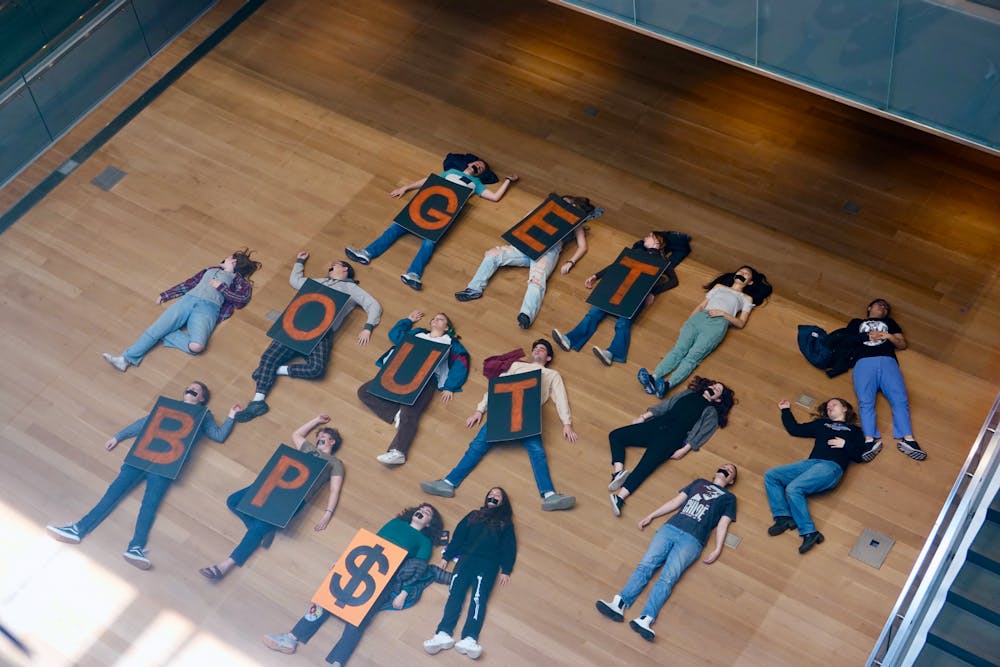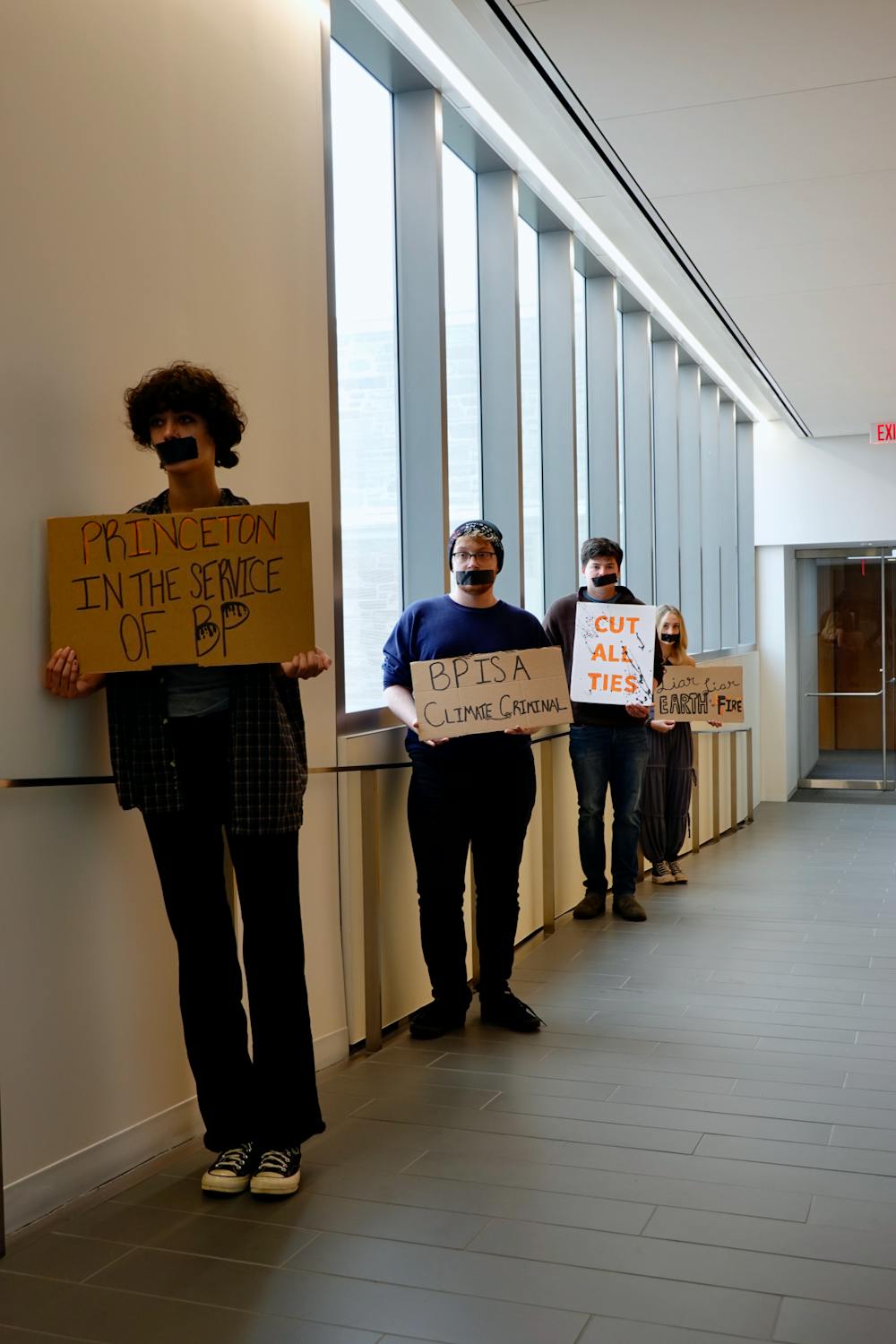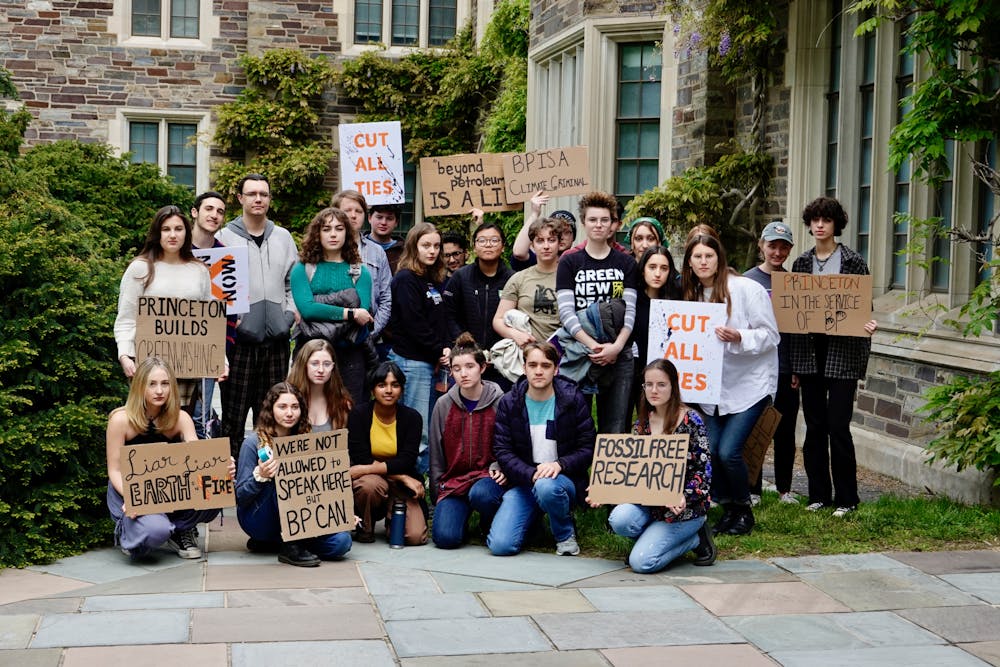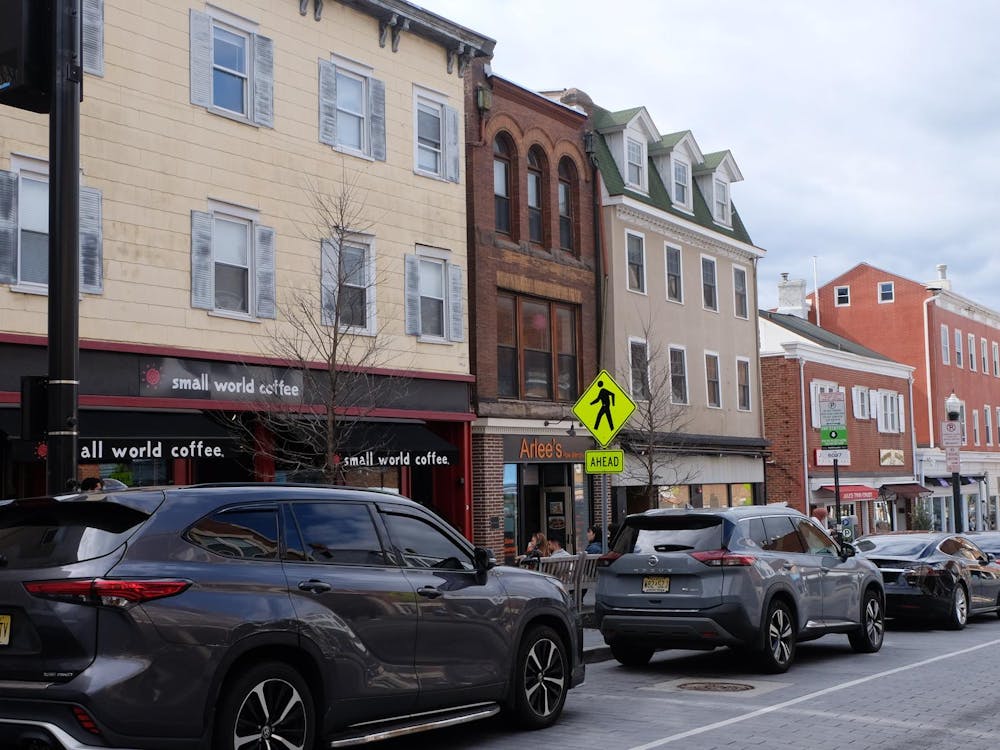At a conference on Friday, May 5, executives from oil and gas companies British Petroleum (BP) and members of the University’s Carbon Mitigation Initiative (CMI), an academic research program within the High Meadows Environmental Institute, were met the sight of students lying on the Julius Romo Rabinowitz (JRR) atrium floor with their mouths duct-taped and eyes closed.
These students, some covered with large letters that spelled “GET OUT BP $,” were affiliated with Divest Princeton, an organization dedicated to push for Princeton’s complete dissociation from fossil fuels and there to protest the University’s connection to BP. Around 30 students were in attendance.
The protest was briefly delayed when the conference ran early and protestors entered the building earlier than they had arranged with the University’s free speech coordinators.

Protesters lying on the JRR atrium floor.
Aaron Serianni / The Daily Princetonian
Since 2000, BP has been the sponsor of the CMI, whose stated goal is “to lead the way to a compelling and sustainable solution to the carbon and climate change problem.”
Eleanor Clemans-Cope ’26, one of the co-coordinators of this protest, told The Daily Princetonian that this relationship is problematic because “BP has proven time and again that it wants to stay with fossil fuels.”

Clemans-Cope is an associate Opinion editor for ‘Prince.’
Alex Norbrook ’26, the other co-coordinator, expanded on what it means for BP to fund the CMI, telling the ‘Prince’ that the CMI “gives BP inside access to the environmental community” due to their research partnership. According to Norbook, BP’s support of the CMI further influences the University’s connection to fossil fuels because BP impacts “what kind of questions and what kind of priorities get researched.”
He added that the protesters were there to call “attention to BP’s continued climate misinformation and the deleterious effects they have on climate policy that stems from Princeton's research.”
Norbrook is a contributing columnist for the ‘Prince.’

CMI Co-Director Stephen Pacala told the ‘Prince’ that “We don’t advise them [BP] about business. We advise them about the environment. We advise them about how the carbon and climate problem must be solved.”
In an earlier conversation with the ‘Prince,’ Pacala had labeled dissociation as “virtue signaling.” In the same ‘Prince’ article, researchers associated with the CMI defended the initiative’s ties with BP, saying that the scientists are able to influence the company through their work.
Activists, however, disagreed with this statement. Lynne Archibald ’87, an activist involved in the Divestment movement, told the ‘Prince,’ “Princeton should not be participating with the fossil fuel industry because it is the industry that is doing the most damage to your future.”
Talia Czuchlewski ’26, another student in Divest, expanded on why this protest was so important and why she was committed to being part of it.
“I can tell that BP funding the CMI is a massive conflict of interest and strongly believe that BP is not doing enough when it comes to protecting future generations against climate change,” Czuchlewski said
In addition to the die-in on the atrium floor, another group of students from Divest lined the hallway on the third floor of JRR, where the conference was being held. Mouths duct-taped, they stood silently with signs that read “We’re not allowed to speak here but BP can,” “BP is a climate criminal,” “Princeton in the service of BP,” and more.

Protesters lined the third floor hallway in JRR
Aaron Serianni / The Daily Princetonian
While the die-in in the atrium was pre-approved by University officials, Divest organizers were told in the process of planning the event that having students standing in the third floor hallway with signs would not be permitted due to concerns about fire safety, according to email conversations between Divest organizers and Associate Dean of Undergraduate Students and Director of Student Agencies Jarrett Fisher obtained by the ‘Prince.’
Several officers from the Department of Public Safety (P-Safe) were also present on the third floor during the protest, as well as Duncan Harrison, the Associate Director of Support Services at P-Safe. According to CMI Program Manager Kristina Corvin, CMI was not informed of the protest in advance.
“I support students’ rights to protest. My main concern was that an important meeting would be disturbed,” Corvin said in an email statement to the ‘Prince.’
In response to questions about the University’s policy for informing relevant parties about protests, University Assistant Vice President for Communications Michael Hotchkiss directed the ‘Prince’ to existing resources on free speech and planning a protest.
At the event, the University also had two Free Speech Coordinators present. These are staff members selected to “attend various campus programs, meetings, and events where University policy on freedom of expression may be challenged.”
Bryce Springfield ’25, who was in attendance, described the presence of the Free Speech Coordinators as “Orwellian.”
“Conservatives are right that free speech is under attack at Princeton, but it’s not in the way that they think,” Springfield said.
The ‘Prince’ spoke to both coordinators at the event. One of them, Giancarlo Ponticello explained, “it’s very standard to have free speech facilitators monitor any demonstration or potentially controversial events.” Ponticello declined to comment any further.
“[We’re here] to make sure that people feel free to protest in appropriate ways to share their views,” said Kate Coppola, the other coordinator.
When the students doing the die-in on the first floor tried to enter the building at noon, Coppola stopped them, since, according to the email exchange between Divest organizers and Fisher, the die-in was approved to take place from 12:30 to 12:45 p.m.
The students, who were under the impression that they were allowed to carry out the die-in during the conference’s lunch break, explained to Coppola that the lunch break had begun earlier than expected. In his email to Dean Fisher, Norbook specifically requested that Divest be allowed to hold the die-in “when the conference is released for lunch.” After this explanation and reassurance that the die-in would only last for 15 minutes, the students were allowed inside the building.
Regarding the protest, Pacala said, “I applaud their activism and their energy and their commitment to the problem. But I also think we’ve got to pick the targets that are going to make the most difference.”
However, Norbrook told the ‘Prince’ that it is important that researchers continue looking for other sources of funding.
“We can have a relationship with BP, but we shouldn’t be completely depending on BP for funding because BP influences what CMI researches and prioritizes,” he said.
Though the University dissociated from 90 fossil fuel companies in September 2022, BP was not among these companies. In April, the ‘Prince’ reported that nearly 40 percent of the graduating class of 2023 felt that Princeton has not gone far enough in its divestment — while only 8.6 percent said that they were satisfied with Princeton’s current divestment.
Miriam Waldvogel is an assistant News editor for the ‘Prince.’
Jeannie Kim is a News contributor for the ‘Prince.’
Please direct any corrections requests to corrections[at]dailyprincetonian.com.








